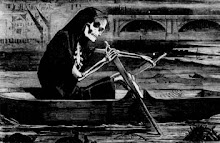I was 21 years old when Margaret Thatcher became prime minister, 33 when she resigned. It was clear to all even then that Britain was changing beyond recognition. Thatcher's government accelerated a process of dramatic reinvention the country had been going through since the end of the second world war, largely through a protracted series of battles fought simultaneously on many fronts, from organised labour to European integration and even the Argentine junta on the seas of the South Atlantic. Thatcher's legacy is clearly visible today and, love her or loathe her (because she pretty much polarised people into one camp or the other) no one can really question her pivotal role in changing the course Britain was on in the nineteen seventies. However, it's not clear to me that this film manages to capture any of that, except perhaps in en passant fashion, which is a great shame because that's a story that still needs to be told.
The Thatcher we see here is old, confused and delusional. Dementia consumes her to the point where she's plagued by the ghost of Dennis, her two-decades-dead husband, continually popping up with that fifties-era "buck up old girl, everything will turn out all right" spirit anyone over 40 will recognise. Yup, the stuff of Shakespeare, but unfortunately without a script to match. Instead, her current condition seems to be not much more than a vehicle through which to cover standard bio-pic fare about her upbringing in Grantham as a grocer's daughter, her hard-fought climb through the ranks of the conservative party and culminating with her becoming what no one - even Thatcher herself - thought was possible: Britain's first woman prime minister. Don't get me wrong, the historical stuff is done well (even if there is quite some licence taken in places) and likely much more interesting to audiences outside of the UK or those who grew up after she was ousted than it was for me. And to be fair, Streep's performance in this film really is extremely good, to the point where most viewers would need to see the two Thatcher's, real and acted, side-by-side in order to tell the difference. However, I was hoping for something more focused, more engaging, more intellectual if you will; something that captured the sweeping change my generation went through with Thatcher as she literally reshaped the socio-political landscape. What we actually got in this film seemed more a commentary on just how much dementia sucks, and we really don't need a statesman laid low as the focal point in order to understand that problem. (Go and see instead the Iris Murdoch bio-pic, also, interestingly, with Jim Broadbent in the role of long-suffering partner, for a picture of the misery and loss Alzheimer's brings with it.)
Bio-pics can work, but you have to come away with a real understanding of what made the subject tick, what drove them, and perhaps more importantly what they lost or gave up along the way. The use of her on-going dementia as a framework around which this film is built gets in the way of that. Her present state blunts a critical examination of the radicalism her premiership was suffused with, implying instead that she was just a tough old bird who had to become more manly than the men around her in order to succeed.
What I'd like to see instead would be a film that explores the end game of her reign as leader of the conservative party, the point where she was no longer seen as an asset by the Tory grandees but rather as a liability. Now that would indeed be a tragedy worth of WS's finest penmanship! Politics at its worst - that story's got it all!
(Professionals have of course written much more perceptive reviews of this film than I, and so I urge you to check out at least this one in the Guardian because it really does a much better job of it than I have. And don't get me wrong, it's a film that's definitely worth seeing, despite the above!)
Wednesday, February 8, 2012
The Iron Lady
Subscribe to:
Comments (Atom)

